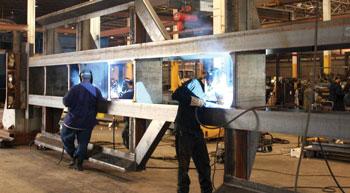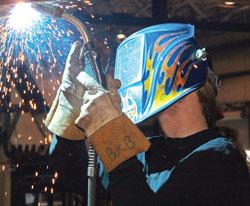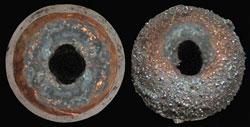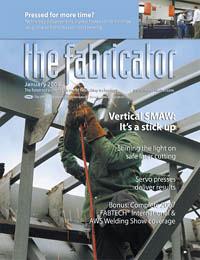- FMA
- The Fabricator
- FABTECH
- Canadian Metalworking
Categories
- Additive Manufacturing
- Aluminum Welding
- Arc Welding
- Assembly and Joining
- Automation and Robotics
- Bending and Forming
- Consumables
- Cutting and Weld Prep
- Electric Vehicles
- En Español
- Finishing
- Hydroforming
- Laser Cutting
- Laser Welding
- Machining
- Manufacturing Software
- Materials Handling
- Metals/Materials
- Oxyfuel Cutting
- Plasma Cutting
- Power Tools
- Punching and Other Holemaking
- Roll Forming
- Safety
- Sawing
- Shearing
- Shop Management
- Testing and Measuring
- Tube and Pipe Fabrication
- Tube and Pipe Production
- Waterjet Cutting
Industry Directory
Webcasts
Podcasts
FAB 40
Advertise
Subscribe
Account Login
Search
Keeping consumables from consuming welding profits
New welding tips help truck, trailer manufacturer cut costs
- January 15, 2008
- Article
- Consumables
The employees of Tico Manufacturing Inc., Ridgeland, S.C., know a few things about the importance of durability. The company builds terminal trucks and trailers that load and unload shipping cargo weighing up to 300,000 pounds.
"Our trucks are not made to be cosmetically beautiful pieces of equipment," explained Production Coordinator Clark Daring. "They are made to sustain enormous weight loads and provide continuous service in very, very brutal environments."
Needless to say, the quality of the welds that go into their products is of the utmost importance as well.
"We have a reputation based on building a durable piece of equipment," Daring said. "From both a business and human safety perspective, we cannot supply a piece of equipment that is subject to breakage. And for that reason, welding quality is of supreme importance and cannot be sacrificed in any way."
Converting Steel Plate Into Trucks and Trailers
Tico typically produces about eight terminal trailers and 12 to 15 terminal trucks a month at its 115,000-square-foot Ridgeland plant. For the trailers and the truck frames, the company brings in plate steel and uses a CNC plasma table to cut the steel to the desired shape before it's taken to a brake press to be bent. Once the initial fabrication process is complete, the company uses a fixturing system (see Figure 1) to position the truck and trailer frames to be welded.
The frames are made of 100 percent mild steel, mostly between 3⁄8 inch and 5⁄8 in. thick, and are welded together using a 0.045-in. E70C-6M metal-cored wire with a 95/5 argon/CO2 gas mix. With the welding power supplies running at about 300 amps, the resulting spray transfer process produces an appealing, mostly spatter-free weld. About 80 percent of the company's welds are all-position fillet welds.
Feeling the sting of the nationwide welder shortage, Tico has opted to institute an in-house welding training program for new employees. "We try to hire people with experience," Daring said, "but oftentimes that's just not possible, particularly when we have ramp-ups in our production schedule."
Although no governing authority regulates its trailers, the company performs regular weld penetration analysis through cut-and-etch visual testing. That said, the real test comes when the trucks and trailers arrive at the shipyards. The company's business model involves leasing and maintaining the trucks and trailers, so it keeps detailed accounts of all of the repair work done.
"Our lease agreement requires us to provide a working piece of equipment, and with the cost of repairs, it's very important for us to provide trucks and trailers that don't break easily," Daring said.
Converting to a Different Contact Tip
In the shipping industry that Tico serves, time is of the essence. The same is true in Tico's manufacturing operations. Manufacturing time is expensive, so the company is continually searching for new ways to improve both the quality of its products and the efficiency of its operations.

Figure 1 Using a large welding fixture for truck and trailer frames allows Tico’s welders to rotate the frames to the desired position for welding. This creates a safer, more productive work environment than if the welders had to adapt to the frame’s position.
Because welding occupies roughly 130 of the 200 total labor-hours required to manufacture a trailer, and 75 of the 200 total hours necessary to manufacture a truck, improving its welding operations would likely net the company the largest overall benefit.
Daring is wary of jumping on the bandwagon without first ensuring a new product will actually create an improvement. "I'm very skeptical about new products," he explained. "I am the type of person who likes to stick with something if it works."
The gas metal arc welding (GMAW) guns and consumables the company was using were getting the job done, so Daring was hesitant when Tico's distributor, Ronnie Peszynski of National Welders Supply, suggested he consider a different line of GMAW gun consumables. Daring agreed to try Bernard's Centerfire™ consumables on one of his company's GMAW guns.
"I provided the system to my best welder because I felt like he would be the one person who could tell me if this was a worthwhile product to invest in," Daring said. "He welded with it four to five hours a day for two weeks."
Tico's top welder, Bryan Cagley, said he liked the nonthreaded contact tip that dropped into place and changed out in about a third of the time it took to unscrew and replace threaded tips. The drop-in tips can be rotated to achieve a more even wear pattern, which helps extend the service life of the tip (seeFigure 2).
The system also has a spatter guard, which is built into the nozzle, that smoothes out the gas flow from the diffuser to decrease gas flow turbulence and increase weld pool protection.
Working in the Southern heat, fans continuously circulate air throughout the plant, increasing the potential for the shielding gas to blow away. According to Tico, the spatter guard improves gas flow (see Figure 3). This, in turn, helps create strong, visually appealing welds with reduced sparks, porosity, and other problems associated with poor gas coverage.
"Weld quality has improved noticeably because of the more accurate and more concentrated gas flow," Daring said. "The improved weld quality has, in turn, led to less rework, which is very expensive and something that we continually strive to minimize."
In addition, contact tip changeout frequency has been reduced from three times a day or more to about once every two weeks.
Averaging approximately three minutes per changeout for its previous brand of contact tips and roughly three changeouts per day, Tico welders spent 180 minutes per day simply changing their contact tips. With an average industry labor cost of $35 per hour, this equals about $1,680 in time spent changing contact tips every month.
The company converted all of its 20 welding stations and three welding gun brands to the new consumables and saved tips, time, and wages.
Bernard®, 449 W. Corning Road, Beecher, IL 60401, 708-946-2281, www.bernardwelds.com
subscribe now

The Fabricator is North America's leading magazine for the metal forming and fabricating industry. The magazine delivers the news, technical articles, and case histories that enable fabricators to do their jobs more efficiently. The Fabricator has served the industry since 1970.
start your free subscription- Stay connected from anywhere

Easily access valuable industry resources now with full access to the digital edition of The Fabricator.

Easily access valuable industry resources now with full access to the digital edition of The Welder.

Easily access valuable industry resources now with full access to the digital edition of The Tube and Pipe Journal.
- Podcasting
- Podcast:
- The Fabricator Podcast
- Published:
- 04/16/2024
- Running Time:
- 63:29
In this episode of The Fabricator Podcast, Caleb Chamberlain, co-founder and CEO of OSH Cut, discusses his company’s...
- Trending Articles
AI, machine learning, and the future of metal fabrication

Employee ownership: The best way to ensure engagement

Steel industry reacts to Nucor’s new weekly published HRC price

Dynamic Metal blossoms with each passing year

Metal fabrication management: A guide for new supervisors

- Industry Events
16th Annual Safety Conference
- April 30 - May 1, 2024
- Elgin,
Pipe and Tube Conference
- May 21 - 22, 2024
- Omaha, NE
World-Class Roll Forming Workshop
- June 5 - 6, 2024
- Louisville, KY
Advanced Laser Application Workshop
- June 25 - 27, 2024
- Novi, MI




























